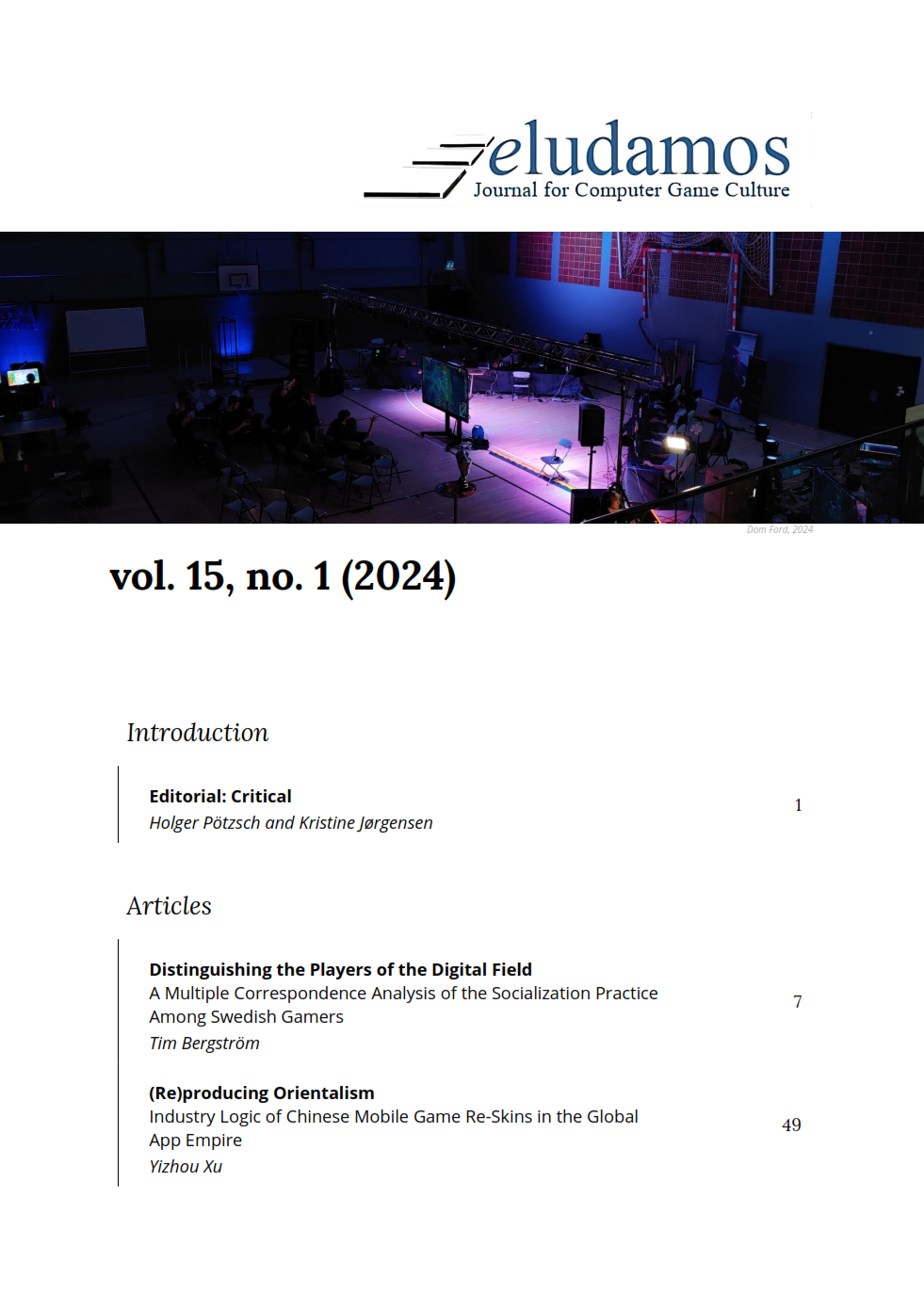Who cares about esports?
Introduction to the special section on Sustaining Equitable Competitive Gaming
DOI:
https://doi.org/10.7557/23.7959Keywords:
Competitive gaming, esports, platformization, labour, careAbstract
Meant as both a provocation and a prompt, ‘who cares about esports?’ opens the topic up to critical scrutiny at a time when the esports industry is in the midst of a(nother) serious contraction, even as there is a sizeable jump in the breadth and amount of esports research. As the introduction to this special section on Sustaining Equitable Competitive Gaming, this article considers the interplay of these two transformations, while also opening up a third, vital line of inquiry: ‘who cares for competitive gaming?’ This question is meant, on the one hand, to underscore the difference—and the relationship—between competitive gaming and esports, while also providing an overview of the kinds of critical and timely care documented by the four articles in this special section.
References
Boluk, S., & LeMieux, P. (2017). Metagaming: Playing, competing, spectating, cheating, trading, making, and breaking videogames. University of Minnesota Press. https://doi.org/10.5749/9781452958354
Boluk, S., & LeMieux, P. (2021). Golden ticket: Money games at the Dota 2 International Championship in China. ROMchip, 3(1). https://romchip.org/index.php/romchip-journal/article/view/137
Bratich, J. Z. (2005). Amassing the multitude: Revisiting early audience studies. Communication Theory, 15(3), 242–265. https://doi.org/10.1111/j.1468-2885.2005.tb00335.x. https://doi.org/10.1093/ct/15.3.242
Chee, F. M. (2023). Digital game culture in Korea: The social at play. Lexington Books. https://doi.org/10.5771/9781793601407
Cote, A. C., Can, Ö., Foxman, M., Harris, B. C., Hansen, J., Rahman, M. W. U., & Fickle, T. (2023). The COVID season: U.S. collegiate esports programs’ material challenges and opportunities during the 2020–21 pandemic. Games and Culture, 18(2), 229–250. https://doi.org/10.1177/15554120221088116. https://doi.org/10.1177/15554120221088116
Fickle, T. (2021). Made in China: Gold farming as alternative history of esports. ROMchip, 3(1). https://www.romchip.org/index.php/romchip-journal/article/view/132
Fletcher, A. (2020). Esports and the color line: Labor, skill and the exclusion of Black players. Proceedings of the 53rd Hawaii International Conference on System Sciences. http://hdl.handle.net/10125/64067. https://doi.org/10.24251/HICSS.2020.325
Franco, J. (2023, August 7). In the trenches of the esports winter. Esportsheaven. https://www.esportsheaven.com/features/in-the-trenches-of-the-esports-winter/
Gay, G. (2010). Culturally responsive teaching: Theory, research, and practice. Teachers College Press.
Hutchins, B. (2008). Signs of meta-change in second modernity: The growth of e-sport and the World Cyber Games. New Media and Society, 10(6), 851–869. https://doi.org/10.1177/1461444808096248 https://doi.org/10.1177/1461444808096248
Ingle, S. (2023). Money talks: How Saudi Arabia’s soft power project is shaking up sport. The Guardian. https://www.theguardian.com/sport/blog/2023/jun/07/saudi-arabia-deal-pga-major-step-sportswashing-golf.
Jenny, S. E., Besombes, N., Brock, T., Cote, A. C., & Scholz, T. M. (Eds.). (2024). Routledge handbook of esports. Routledge. https://doi.org/10.4324/9781003410591 https://doi.org/10.4324/9781003410591
Johnson, M. R., & Woodcock, J. (2021). Work, play, and precariousness: An overview of the labour ecosystem of esports. Media, Culture & Society, 43(8), 1449–1465. https://doi.org/10.1177/01634437211011555 https://doi.org/10.1177/01634437211011555
Kittler, F. (2010). Optical media: Berlin lectures 1999 (A. Enns, Trans.). Polity.
Lee, A. (2023, June 29). The digiday guide to esports winter. Digiday. https://digiday.com/marketing/the-digiday-guide-to-esports-winter/
Michel, A. H. (2024, July 5). Every time you post to Instagram, you’re turning on a light bulb forever. The Atlantic. https://www.theatlantic.com/technology/archive/2024/07/how-much-data-ai-use/678908/
Nieborg, D. B., & Poell, T. (2018). The platformization of cultural production: Theorizing the contingent cultural commodity. New Media & Society, 20(11), 4275–4292. https://doi.org/10.1177/1461444818769694 https://doi.org/10.1177/1461444818769694
Nothelfer, N., Jenny, S. E., & Besombes, N. (2024). Defining and spelling esports. In S. E. Jenny, N. Besombes, T. Brock, A. C. Cote, & T. M. Scholz (Eds.), Routledge handbook of esports (pp. 6–18). Routledge. https://doi.org/10.4324/9781003410591 https://doi.org/10.4324/9781003410591-3
Partin, W. C. (2019). Watch me pay: Twitch and the cultural economy of surveillance. Surveillance & Society, 17(1/2), 153–160. https://doi.org/10.24908/ss.v17i1/2.13021 https://doi.org/10.24908/ss.v17i1/2.13021
Partin, W. C. (2024). The e in esports: The platformization of professional gaming. University of North Carolina.
Partin, W. C., & Howard, M. J. (2021). The origins of esports scholarship: A group interview. ROMchip, 3(1). https://romchip.org/index.php/romchip-journal/article/view/141
Peters, J. D. (2010). Mass media. In W. J. T. Mitchell & M. B. N. Hansen (Eds.), Critical Terms for Media Studies (pp. 266–280). University of Chicago Press.
Siegert, B. (2015). Cultural techniques: Grids, filters, doors, and other articulations of the real. Fordham University Press. https://doi.org/10.5422/fordham/9780823263752.001.0001
Szablewicz, M. (2020). Mapping digital game culture in China: From internet addicts to esports athletes. Palgrave Macmillan. https://doi.org/10.1007/978-3-030-36111-2
Taylor, N. T. (2009). Power play: Digital gaming goes pro. York University.
Taylor, N. T. (2016). Now you’re playing with audience power: The work of watching Games. Critical Studies in Media Communication, 33(4), 293–307. https://doi.org/10.1080/15295036.2016.1215481. https://doi.org/10.1080/15295036.2016.1215481
Taylor, N. T. (2024). The grounds of gaming. Indiana University Press. https://doi.org/10.2979/18384.0
Taylor, N. T., & Hammond, R. (2018). Outside the lanes: Supporting a non-normative League of Legends community. In T. Harper, M. Blythe-Adams, & N. T. Taylor (Eds.), Queerness in play. Palgrave games in context (pp. 225–242). Palgrave Macmillan. https://doi.org/10.1007/978-3-319-90542-6_13
Taylor, N. T., & Stout, B. (2020). Gender and the two-tiered system of collegiate esports. Critical Studies in Media Communication, 37(5), 451–465. https://doi.org/10.1080/15295036.2020.1813901 https://doi.org/10.1080/15295036.2020.1813901
Taylor, T. L. (2015). Raising the stakes: E-sports and the professionalization of computer gaming. The MIT Press.
Taylor, T. L. (2018). Watch me play: Twitch and the rise of game live streaming. Princeton University Press. https://doi.org/10.1515/9780691184975
Tufekci, Z. (2017). A networked public. In Twitter and tear gas: The power and fragility of networked protest (pp. 3–28). Yale University Press.
Wilde, T. (2022). Major esports host ESL Gaming is now owned by Saudi Arabia. PC Gamer. https://www.pcgamer.com/esl-and-dreamhack-are-now-owned-by-saudi-arabia/.
Witkowski, E. (2012). On the digital playing field: How we “do sport” with networked computer games. Games and Culture, 7(5), 349–374. https://doi.org/10.1177/1555412012454222 https://doi.org/10.1177/1555412012454222
Witkowski, E. (2018). Doing/undoing gender with the girl gamer in high-performance play. In K. Gray, E. Vossen, & G. Voorhees (Eds.), Feminism in play (pp. 185–203). Palgrave Macmillan. https://doi.org/10.1007/978-3-319-90539-6_11
Downloads
Published
How to Cite
Issue
Section
License
Copyright (c) 2024 Nicholas T. Taylor

This work is licensed under a Creative Commons Attribution 4.0 International License.







